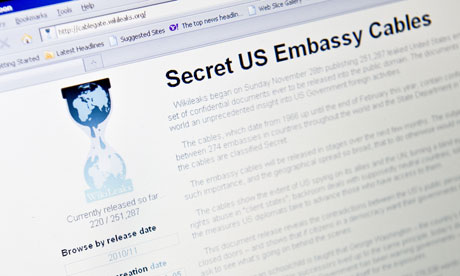Saturday, December 11, 2010
WikiLeaks row: why Amazon's desertion has ominous implications for democracy
Amazon's decision to abandon WikiLeaks sends out a clear message: you can publish what you like – as long as it meets with the government's approval

One of the most interesting aspects of the WikiLeaks controversy is the light it has shed on the providers of cloud computing. One after another they have fallen over like dominoes when the going got rough.
First, some of the ISPs hosting WikiLeaks caved in; then EveryDNS, the company that mapped its domain names (eg wikileaks.org) on to machine addresses, dropped it; then Amazon, which had enough computer power and bandwidth to resist even the most determined cyber-attacks, took it off its computers; then PayPal and later Mastercard, the online conduits for donations, cancelled its accounts. The rationalisations these outfits gave for dropping WikiLeaks had a common theme, namely that it had violated the terms and conditions under which the terminated services had been provided.
Amazon is the most interesting case. It provides so-called "cloud computing services" by renting out some of the thousands of computers used to run its online store. WikiLeaks moved its site on to Amazon's cloud to ensure that it would not be crippled by the denial-of-service attacks that had brought other ISPs to their knees.
But then the company received a call from senator Joseph Lieberman, the kind of politician who gives loose cannons a bad name, who had been frothing about WikiLeaks being "implacably hostile to our military and the most basic requirements of our national security". Some time after that, Amazon terminated WikiLeaks's account.
Lieberman then declared: "I will be asking Amazon about the extent of its relationship with WikiLeaks and what it and other web service providers will do in the future to ensure that their services are not used to distribute stolen, classified information."
Amazon denied that it had caved in to "a government inquiry" but declared that it had kicked WikiLeaks out because it was not adhering to the company's terms and conditions — which require that "you warrant that you own or otherwise control all of the rights to the content" and "that use of the content you supply... will not cause injury to any person or entity".
The more you think about it, the more disturbing this becomes.
What gives a US senator the right to ask anybody about "the extent of its relationship" with WikiLeaks? His declaration led the New Yorker's Amy Richardson to wonder "if Lieberman feels that he, or any senator, can call in the company running the New Yorker's printing presses when we are preparing a story that includes leaked classified material, and tell it to stop us".
And what about Amazon's assertion that WikiLeaks "doesn't own or otherwise control" all the rights to the classified cables that it published? As Markus Kuhn, a computer security researcher at the Cambridge Computer Lab, pointed out to me, any work "prepared by an officer or employee of the US government as part of that person's official duties" is not entitled to domestic copyright protection under US law. So, in the US at least, the leaked cables are not protected by copyright and it doesn't matter whether WikiLeaks owns the rights or not.
But, in a way, that's the least worrying aspect of Amazon's behaviour. More troubling is what its actions portend for democracy.
Rebecca MacKinnon, a scholar who has written incisively about China's efforts to censor the net, wrote a sobering essay about this last week. "A substantial, if not critical amount of our political discourse," she points out, "has moved into the digital realm. This realm is largely made up of virtual spaces that are created, owned and operated by the private sector."
Yep. For years people have extolled cloud computing as the way of the future. The lesson of the last week is simple: be careful what you wish for.
AMAZON ALSO REFUSED TO SELL ONLINE DR. GONCALO AMARAL'S BOOK .THROUGH THEIR LAWYERS CARTER RUCK, THE MCCANNS FORBID THE BRITISH PEOPLE TO READ THIS BOOK 'THE TRUTH OF THE LIE' IS A TOP BEST SELLER. I LIKE MANY OTHERS WILL NEVER USE AMAZON AGAIN. 'The Truth of the Lie' explains how Madeleine died in Apartment 5a. The McCanns do not want this information out there. AMAZON will now lose many valuable customs for buckling to the Americans.

